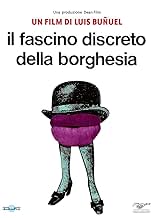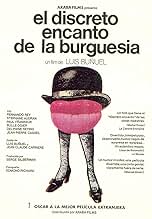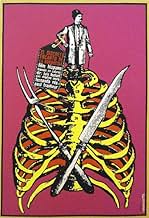ÉVALUATION IMDb
7,7/10
49 k
MA NOTE
Une série de rêves surréalistes, concentrés sur six personnes de la petite bourgeoisie et leurs tentatives constamment interrompues de prendre un repas ensemble.Une série de rêves surréalistes, concentrés sur six personnes de la petite bourgeoisie et leurs tentatives constamment interrompues de prendre un repas ensemble.Une série de rêves surréalistes, concentrés sur six personnes de la petite bourgeoisie et leurs tentatives constamment interrompues de prendre un repas ensemble.
- Director
- Writers
- Stars
- A remporté 1 oscar
- 7 victoires et 9 nominations au total
Stéphane Audran
- Alice Sénéchal
- (as Stephane Audran)
Avis en vedette
Bunuel is arguably the greatest of all filmmakers. With the possible exceptions of Hitchcock and Fassbinder, I can think of no other director who so completely understood the potential of the medium to transcend the traditional conventions of narrative, or exploited this potential with such élan. And he doesn't rely on special effects: we enter the surreal realm so seamlessly that it at times seems banal. This is especially the case in 'Le charme': banal people have banal sub-consciousnesses.
In order to begin to appreciate Bunuel I had to immerse myself in his milieu, so foreign was his sensibility to the usual expectations I had brought with me into a movie theater.
It took me several viewings to get the 'jokes' if 'Le charme'. The Ambassador from some obscure Latin American country ('Miranda', or 'wonder', a nod to Shakespeare), supports this little microcosm of comfortable Parisian bourgeois respectability with cocaine smuggled in diplomatic pouches. Guests arrive for a dinner party on the wrong evening, and interrupt the hosts having sex. A wake is being held in the back room of the restaurant they are planning to dine at. Ice cubes for martinis must be 'exactly zero degrees'. Elegant ladies sit down for a fashionable afternoon tea, only to be told by their waiter that the restaurant has run out of water (?!!). A soldier then comes to their table and relates his parricidal dream, while the polite ladies listen to him unfazed. One of the ladies discreetly slips away for an assignation with another one's husband. Only Bunuel!
Doubtless the inspiration for this film comes from the Latin Bunuel's lifetime of experience observing the French in situ. Much of its fun comes from simply watching the French be so . . . French. And there is no bourgeois like a French bourgeois!
Much of 'Le Charme' takes place in the nightmares of its characters: you are sitting down for a dinner being hosted by a general, only to realize that you are on stage (with a prompter giving a cue from Don Juan: 'Invite the commander's ghost for dinner!'); your elegant dinner party is broken up by a gang of thugs looking to kill you. However, you are so wedded to the ceremony of the dinner party that you get caught stealing a piece of meat from the table under which you are hiding (and end up dying like a dog!)
I could see this movie a hundred times and always find something new. I would never be bored by it.
Bunuel is very funny, but he is also dense and difficult. One doesn't realize the true complexity of his films because they all seem so effortless. Nothing great comes easily. He's like great Bordeaux: you can't quaff it -- it demands to be sipped.
Bunuel is famous for having the lowest shoot to take ratio of any filmmaker, less than 2:1. Second takes were rare (compare with the reams that end up on the cutting room floor for the typical Spielberg film.) He knew exactly what he wanted to see before he shot. Hitchcock, a director who resembles Bunuel in many ways, famously referred to actors as 'cattle'. For Bunuel, they were probably more like toy soldiers. This isn't to say that he didn't get brilliant performances out of them, especially from his screen alter-ego, the wonderful Fernando Rey.
Henry Miller dubbed his good friend Luis Bunuel "The Last Heretic". I can't think of a higher compliment. Bunuel's memoirs, 'My Last Sigh', are a must read for anyone who wants to have an appreciation of Paris in the 20s, the of art in the last century, and martinis, made as they should be, with gin.
In order to begin to appreciate Bunuel I had to immerse myself in his milieu, so foreign was his sensibility to the usual expectations I had brought with me into a movie theater.
It took me several viewings to get the 'jokes' if 'Le charme'. The Ambassador from some obscure Latin American country ('Miranda', or 'wonder', a nod to Shakespeare), supports this little microcosm of comfortable Parisian bourgeois respectability with cocaine smuggled in diplomatic pouches. Guests arrive for a dinner party on the wrong evening, and interrupt the hosts having sex. A wake is being held in the back room of the restaurant they are planning to dine at. Ice cubes for martinis must be 'exactly zero degrees'. Elegant ladies sit down for a fashionable afternoon tea, only to be told by their waiter that the restaurant has run out of water (?!!). A soldier then comes to their table and relates his parricidal dream, while the polite ladies listen to him unfazed. One of the ladies discreetly slips away for an assignation with another one's husband. Only Bunuel!
Doubtless the inspiration for this film comes from the Latin Bunuel's lifetime of experience observing the French in situ. Much of its fun comes from simply watching the French be so . . . French. And there is no bourgeois like a French bourgeois!
Much of 'Le Charme' takes place in the nightmares of its characters: you are sitting down for a dinner being hosted by a general, only to realize that you are on stage (with a prompter giving a cue from Don Juan: 'Invite the commander's ghost for dinner!'); your elegant dinner party is broken up by a gang of thugs looking to kill you. However, you are so wedded to the ceremony of the dinner party that you get caught stealing a piece of meat from the table under which you are hiding (and end up dying like a dog!)
I could see this movie a hundred times and always find something new. I would never be bored by it.
Bunuel is very funny, but he is also dense and difficult. One doesn't realize the true complexity of his films because they all seem so effortless. Nothing great comes easily. He's like great Bordeaux: you can't quaff it -- it demands to be sipped.
Bunuel is famous for having the lowest shoot to take ratio of any filmmaker, less than 2:1. Second takes were rare (compare with the reams that end up on the cutting room floor for the typical Spielberg film.) He knew exactly what he wanted to see before he shot. Hitchcock, a director who resembles Bunuel in many ways, famously referred to actors as 'cattle'. For Bunuel, they were probably more like toy soldiers. This isn't to say that he didn't get brilliant performances out of them, especially from his screen alter-ego, the wonderful Fernando Rey.
Henry Miller dubbed his good friend Luis Bunuel "The Last Heretic". I can't think of a higher compliment. Bunuel's memoirs, 'My Last Sigh', are a must read for anyone who wants to have an appreciation of Paris in the 20s, the of art in the last century, and martinis, made as they should be, with gin.
I am surprised that nobody recognized what the author wanted to say with this movie. The whole movie (except the last few minutes) is a dream of one ordinary man. He probably went to sleep without having dinner, and in his dream he pass through various situations where he and his friends intend to eat. But, they were interrupted every time, and he did not manage to have his meal at all. The reasons are every time stranger and stranger. Finally he woke up, goes to the kitchen and took from his refrigerator everything he find's. In one sentence, this movie is about our lust for eating. Simple, but extraordinary.
A satire on everyone who's too big for their boots (or secretly wants 2 B), because they will not achieve the aims they pursuit and are ultimately doomed to be separated from their privileges when they wake up to reality. The story may also come across as remote parody on The Last Supper, but from the bourgeois point of view (who never really get their supper), in contrast with 'Viridiana' (1961, Buñuel), where the poor and disabled DO get their Last Supper. But I don't know much about the bible, so I'm probably wrong about that. It proves though that you don't have to be pious to appreciate Buñuel's films; in fact, you'd better NOT be.
The 'adventure' of the protagonists is a proverbial sinking ship, because they seem to know what they want, but never reach their goal, which is quite simple and basic (to eat), because they're so caught up in supposed etiquette. They have all kinds of knowledge about manners and gestures, but they cannot sit down and eat. That is actually a fairly clear message: 'look before you leap' or 'behold the priorities of life'.
What's more indiscrete: drinking a martini the wrong way, or selling cocaine abusing your position as an ambassador and fooling around in the garden while you're having friends over for diner? And are you ultimately discrete simply because nobody discovers your subversive or criminal actions? These guys just can't control their carnal and financial lust, while complaining: 'No system can give the masses the proper social graces. But you know me, I'm not a reactionary.' Blah.
Cinematographer Edmond Richard (Le Procès (1963, Welles), Fantôme de la liberté, Cet obscur objet du désir) exhibits his excellent collaboration with Buñuel's visions. Buñuel tried before to make it easier for audiences to understand the imagery by incorporating it in a dream sequence (e.g. Tristana, 1970), but he returns here (as in Belle de Jour, 1967) to the early days (1930) where the dream sequences were just put forward as if they were reality. You'll never know what is a dream and what is real. As always, there is no music here to guide you, apart from the ringing church bells. Just open up your ears and clean out your eyes and you'll not be disappointed.
One last remark: the cover of the video is definitely one of the most applicable and distinctive covers (Ferracci) ever made, as is the cover of 'Fantôme de la liberté' (an odd-faced statue of liberty with a limp torch) by Jean-Paul Commandeur and the cover of 'Cet obscur objet du désir'. Buñuel didn't worry about the surrealism in his own life. He seemed to live in harmony with all his contradictions and hypocrisy.
10 points out of 10 :-)
The 'adventure' of the protagonists is a proverbial sinking ship, because they seem to know what they want, but never reach their goal, which is quite simple and basic (to eat), because they're so caught up in supposed etiquette. They have all kinds of knowledge about manners and gestures, but they cannot sit down and eat. That is actually a fairly clear message: 'look before you leap' or 'behold the priorities of life'.
What's more indiscrete: drinking a martini the wrong way, or selling cocaine abusing your position as an ambassador and fooling around in the garden while you're having friends over for diner? And are you ultimately discrete simply because nobody discovers your subversive or criminal actions? These guys just can't control their carnal and financial lust, while complaining: 'No system can give the masses the proper social graces. But you know me, I'm not a reactionary.' Blah.
Cinematographer Edmond Richard (Le Procès (1963, Welles), Fantôme de la liberté, Cet obscur objet du désir) exhibits his excellent collaboration with Buñuel's visions. Buñuel tried before to make it easier for audiences to understand the imagery by incorporating it in a dream sequence (e.g. Tristana, 1970), but he returns here (as in Belle de Jour, 1967) to the early days (1930) where the dream sequences were just put forward as if they were reality. You'll never know what is a dream and what is real. As always, there is no music here to guide you, apart from the ringing church bells. Just open up your ears and clean out your eyes and you'll not be disappointed.
One last remark: the cover of the video is definitely one of the most applicable and distinctive covers (Ferracci) ever made, as is the cover of 'Fantôme de la liberté' (an odd-faced statue of liberty with a limp torch) by Jean-Paul Commandeur and the cover of 'Cet obscur objet du désir'. Buñuel didn't worry about the surrealism in his own life. He seemed to live in harmony with all his contradictions and hypocrisy.
10 points out of 10 :-)
Director Luis Bunuel is often described as a surrealist, but the word misapplied in reference to his later works, where the the term absurdism is much more appropriate. Such is the case with the Academy Award-winning THE DISCREET CHARM OF THE BOURGEOISIE, which begins with four friends who arrive at their hosts' home only to discover they have arrived on the wrong night--a plausible situation. But before the film has run its course, Bunuel unravels his tale of a meal that never quite happens in the most unexpected ways imaginable.
The film works on several levels, mocking social conventions, the church, and eventually spilling its action into a series of overlapping nightmares in which various attempts to dine are frustrated by everything from the corpse of a restaurant manager in a nearby room to military maneuvers. On one memorable occasion, the friends are invited to dine and are seated around an elegant table--when a curtain suddenly rises behind them and reveals them to be seated on a stage before a hostile audience! The cast (which features Fernando Rey, Delphine Seyrig, Paul Frankeur, Bulle Ogier, Stephane Audran and Jean-Pierre Cassel as the constantly frustrated diners) plays with considerable aplomb, performing the most irrational scenes with a magnificent realism. When combined with Bunuel's absurdist story, the result is a disquieting yet often very funny discourse on frustrated appetites both real and imagined, and with many layers of incidental meaning along the way.
A word of caution to the uninitiated: Bunuel is not for those who seek a tidy plot line with clear-cut meanings. But if you come to it with an open mind, you'll find plenty of food for thought!
Gary F. Taylor, aka GFT, Amazon Reviewer
The film works on several levels, mocking social conventions, the church, and eventually spilling its action into a series of overlapping nightmares in which various attempts to dine are frustrated by everything from the corpse of a restaurant manager in a nearby room to military maneuvers. On one memorable occasion, the friends are invited to dine and are seated around an elegant table--when a curtain suddenly rises behind them and reveals them to be seated on a stage before a hostile audience! The cast (which features Fernando Rey, Delphine Seyrig, Paul Frankeur, Bulle Ogier, Stephane Audran and Jean-Pierre Cassel as the constantly frustrated diners) plays with considerable aplomb, performing the most irrational scenes with a magnificent realism. When combined with Bunuel's absurdist story, the result is a disquieting yet often very funny discourse on frustrated appetites both real and imagined, and with many layers of incidental meaning along the way.
A word of caution to the uninitiated: Bunuel is not for those who seek a tidy plot line with clear-cut meanings. But if you come to it with an open mind, you'll find plenty of food for thought!
Gary F. Taylor, aka GFT, Amazon Reviewer
"The Discreet Charm of the Bourgeoisie", a leisurely paced, incisive satire on social mores and class hypocrisy, opens with a group of friends arriving on the wrong day of a dinner engagement. this is only the begining of a succession of unexpected and unusual events to follow. The dinner party is the movie's main setting and it is there that reality and illusion often times blend imperceptibly together. The film is structured as a series of surreal sequences, which prompted esteemed film critic Pauline Kael to opine 'His(Director Louis Bunuel) indifference to dramatic logic is complete.' And how. Bunuel's narrative plays an elaborate game with the viewer through it's subconscious imagery and audacious use of time. His tendency to experiment with technique and form often times led to discovery and innovation. The cinema of Louis Bunuel invariably deals with the discrepancy between appearance and reality; decorum and desire. His world view was subversive and anarchistic. He was a cheerful pessimist, skeptical but not susceptible to Bergmanian despair. His skepticism extended to all of those he found playing too neat a social game. The filmmaker's career was one sustained assault on authoritarianism. Witness an indiscreet character in the film who claims: 'No one system can help the masses acquire refinement.' He believed man was, unconsciously, a slave to custom and aimed to shock viewers out of their unthinking acceptance of established values. "The Discreet Charm of the Bourgeoisie"(An Academy Award winner in 1972 for Best Foreign Film) is a boldly inventive picture. Dozens of frames are filled with clever filmic devices: environmental noises increase inordinately during routine conversations; an ambiguous procession is inserted freely within the text. These cinematic ploys add intrigue to the already peculiar goings-on. The walk by the main group of characters along a country roadside is mysterious and compelling. The players are noticeably silent and contemplative. Is this an anxious dream? The afterlife? An insignificant flashback? Whichever, the recurring sequence underscores the obliqueness and cool obscurity of the film. One might not identify closely with the disenchanted Bunuelian sensibility or the unsentimental stance he takes, however one knows immediately and unmistakably that they are in the gifted hands of a film technician like a Godard or Kurosawa. A director in complete control of his medium. A highly personal filmmaker frequently referred as 'a poet of hallucination who follows the caprices of his fantastical imagination.' Someone whose fanciful paths of creation were invariably led by the irrational. "The Discreet Charm of the Bourgeoisie", with it's arresting mixture of calculation and carelessness, remains a unique and influential movie. The acerbic films of Robert Altman and the perverse mischievousness of the Coen brothers films, to mention but a few, pay a large debt to the strange universe and unconventional perspective of Louis Bunuel. Film lovers uninitiated in surrealist cinema will find "The Discreet Charm of the Bourgeoisie" an alluring and beguiling crash course.
Le saviez-vous
- AnecdotesThe movie includes three of Luis Buñuel's recurring dreams: a dream of being on stage and forgetting his lines, a dream of meeting his dead cousin in the street and following him into a house full of cobwebs, and a dream of waking up to see his dead parents staring at him.
- GaffesAfter Rafael gives the terrorist champagne, his position in the chair changes between shots.
- Citations
Rafael Acosta: You're much better suited for making love than for making war. Vamos, muchacha. Vamos.
- ConnexionsFeatured in Pour le cinéma: Episode dated 16 September 1972 (1972)
Meilleurs choix
Connectez-vous pour évaluer et surveiller les recommandations personnalisées
- How long is The Discreet Charm of the Bourgeoisie?Propulsé par Alexa
Détails
- Date de sortie
- Pays d’origine
- Site officiel
- Langues
- Aussi connu sous le nom de
- The Discreet Charm of the Bourgeoisie
- Lieux de tournage
- société de production
- Consultez plus de crédits d'entreprise sur IMDbPro
Box-office
- Budget
- 800 000 $ US (estimation)
- Brut – États-Unis et Canada
- 82 471 $ US
- Fin de semaine d'ouverture – États-Unis et Canada
- 6 075 $ US
- 26 juin 2022
- Brut – à l'échelle mondiale
- 103 230 $ US
Contribuer à cette page
Suggérer une modification ou ajouter du contenu manquant

Lacune principale
By what name was Le charme discret de la bourgeoisie (1972) officially released in India in English?
Répondre



































